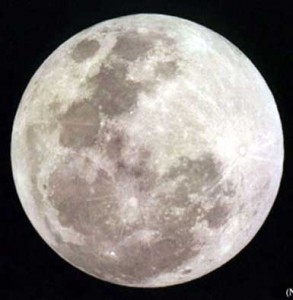 The next time you can’t go back to sleep, look out the window and up at the sky; a full moon may be working its mojo. HealthDay reports that researchers at the University of Basel studied the sleep pattern of 33 healthy people who spent three and a half days in a sleep lab, where they were unable to see clocks or outside light. Scientists tracked their hormones and brain activity, and recorded how long it took people to fall asleep, as well as their total sleep time. The researchers then took all the data collected on nights of normal sleep and compared it to the phases of the moon. Guess what? In the four days before and after a full moon, the sleepers got an average of about 20 minutes less sleep, and the amount of time they spent in deep sleep decreased by about a third. They also made less melatonin, the hormone that makes people feel drowsy after dark. Read more from HealthDay. Read an abstract of the study here.
The next time you can’t go back to sleep, look out the window and up at the sky; a full moon may be working its mojo. HealthDay reports that researchers at the University of Basel studied the sleep pattern of 33 healthy people who spent three and a half days in a sleep lab, where they were unable to see clocks or outside light. Scientists tracked their hormones and brain activity, and recorded how long it took people to fall asleep, as well as their total sleep time. The researchers then took all the data collected on nights of normal sleep and compared it to the phases of the moon. Guess what? In the four days before and after a full moon, the sleepers got an average of about 20 minutes less sleep, and the amount of time they spent in deep sleep decreased by about a third. They also made less melatonin, the hormone that makes people feel drowsy after dark. Read more from HealthDay. Read an abstract of the study here.
